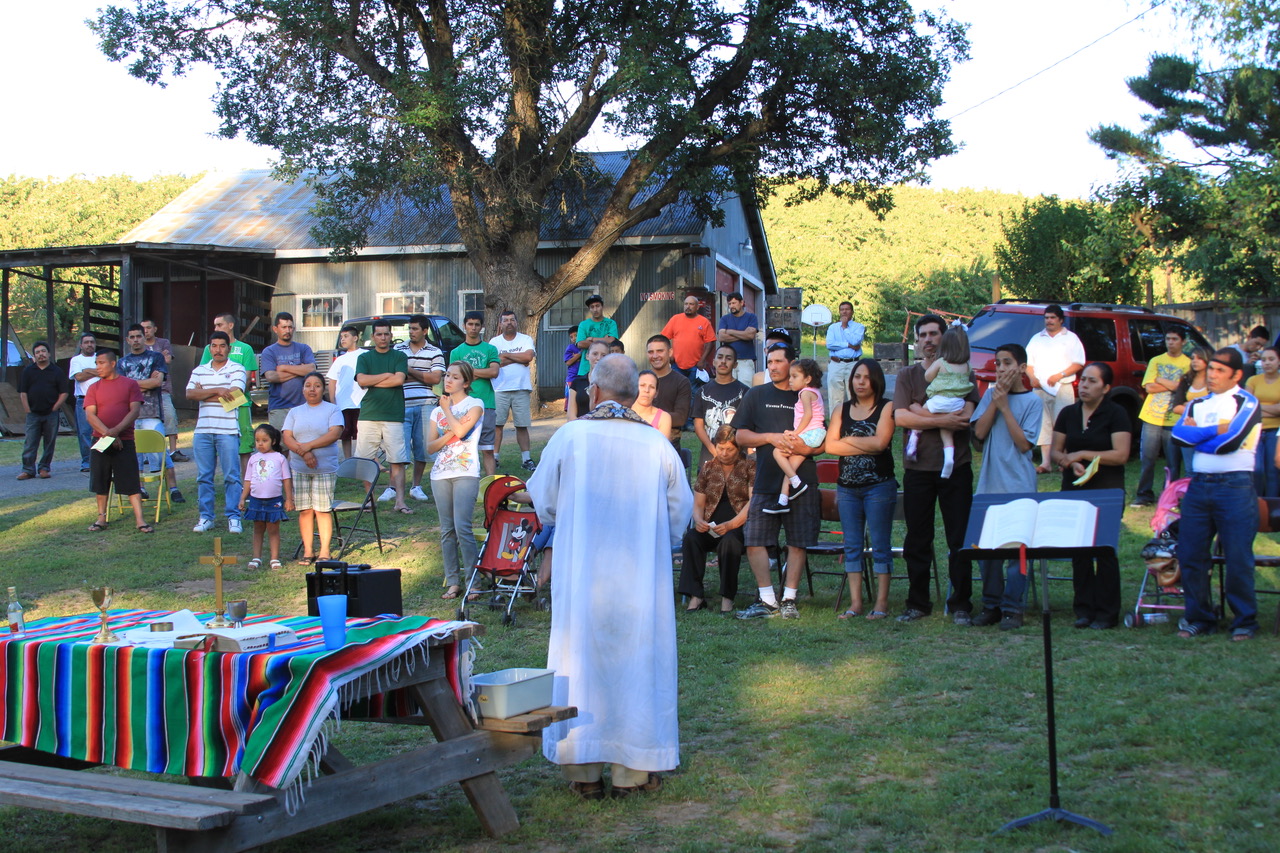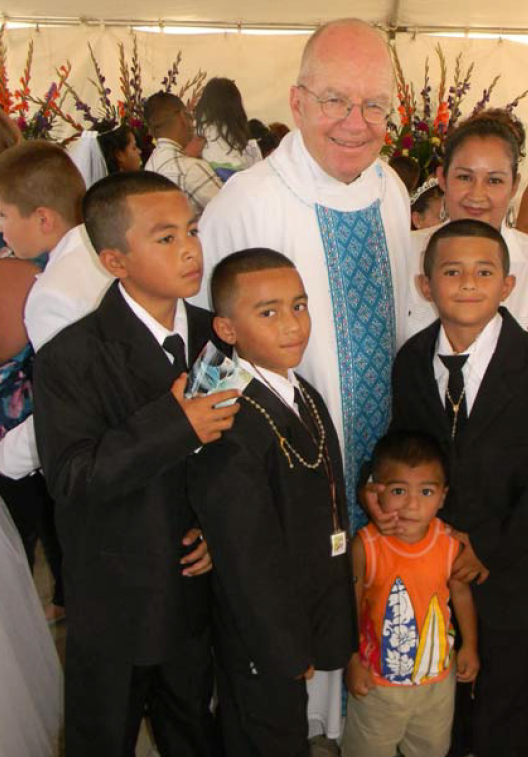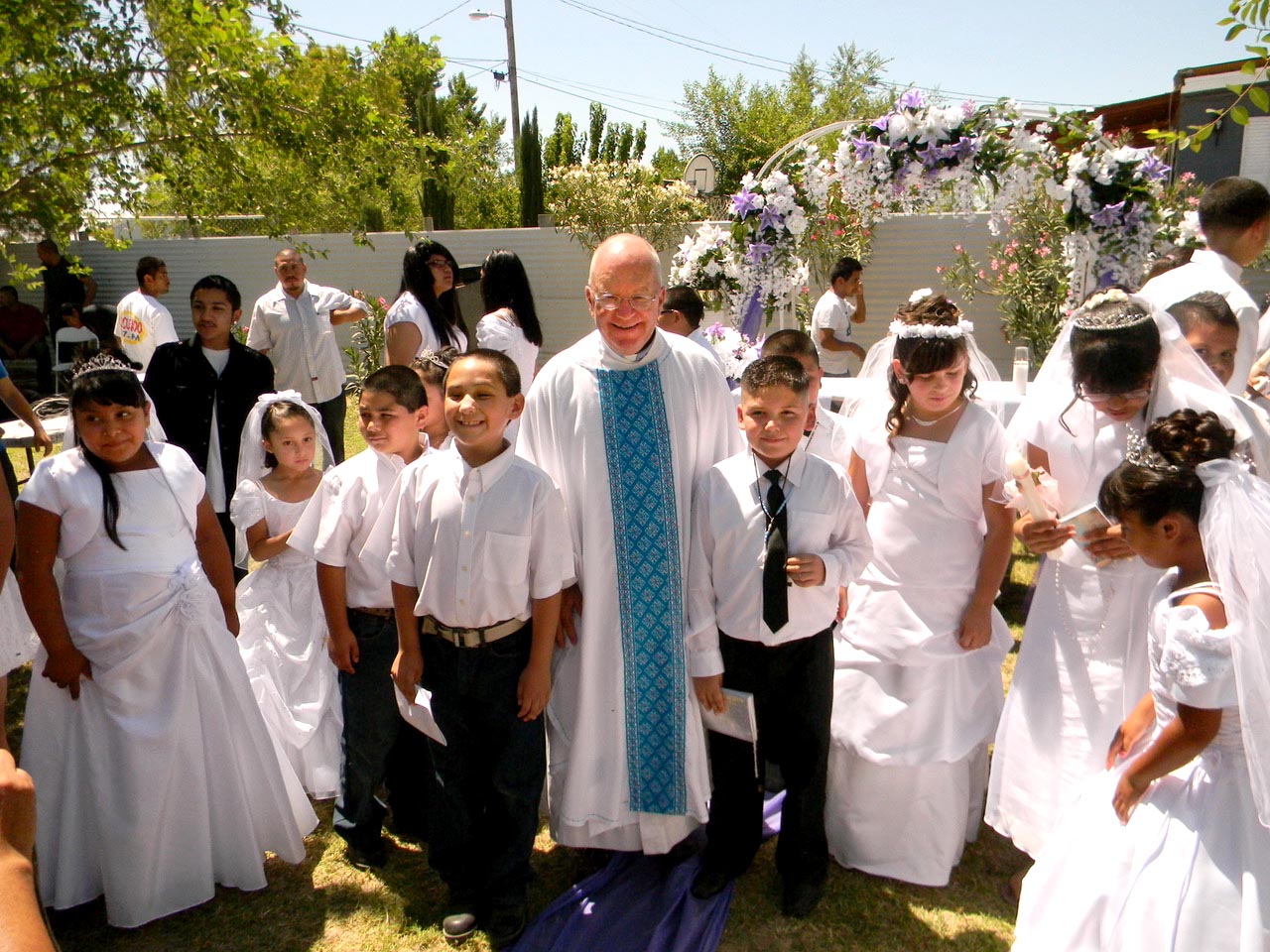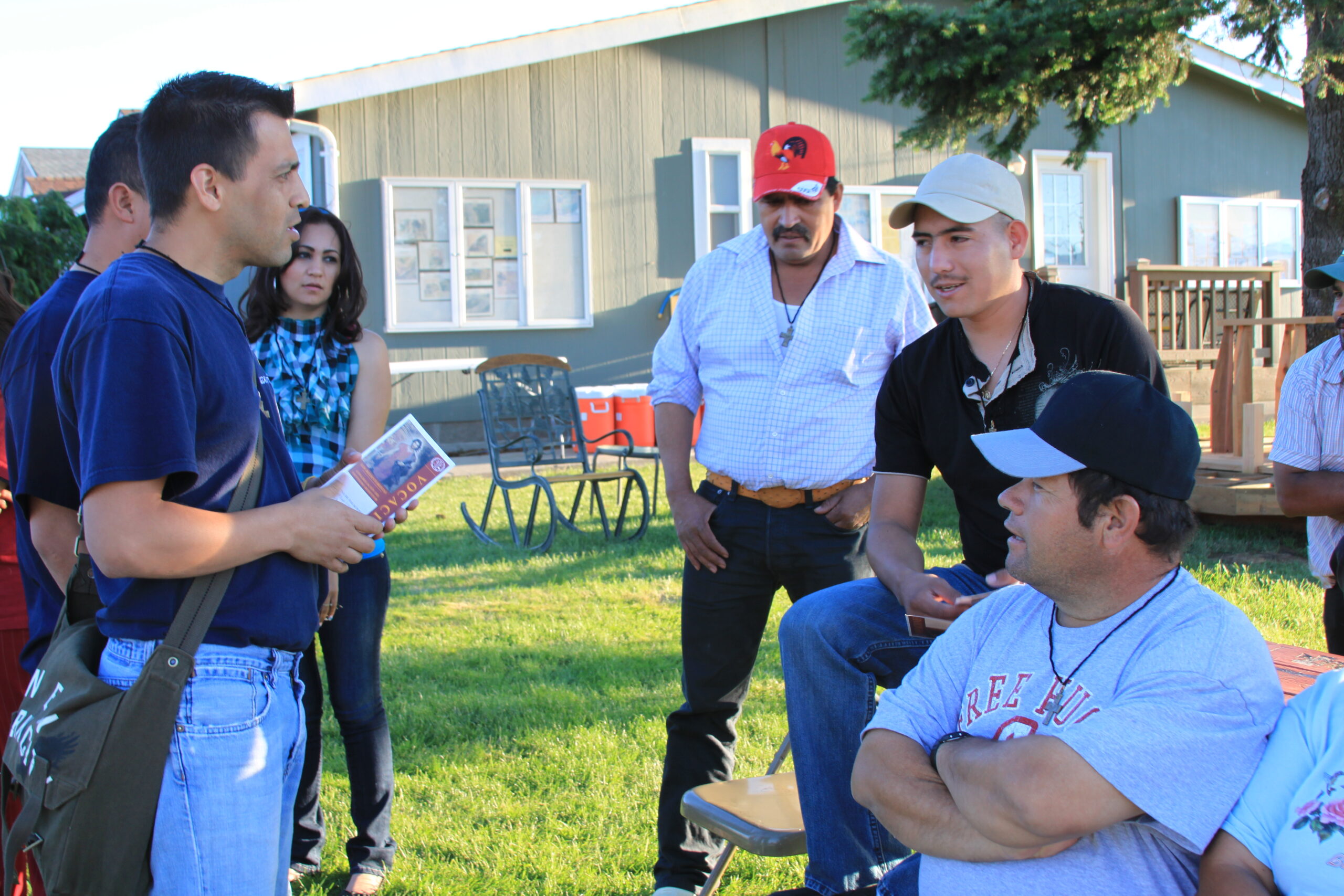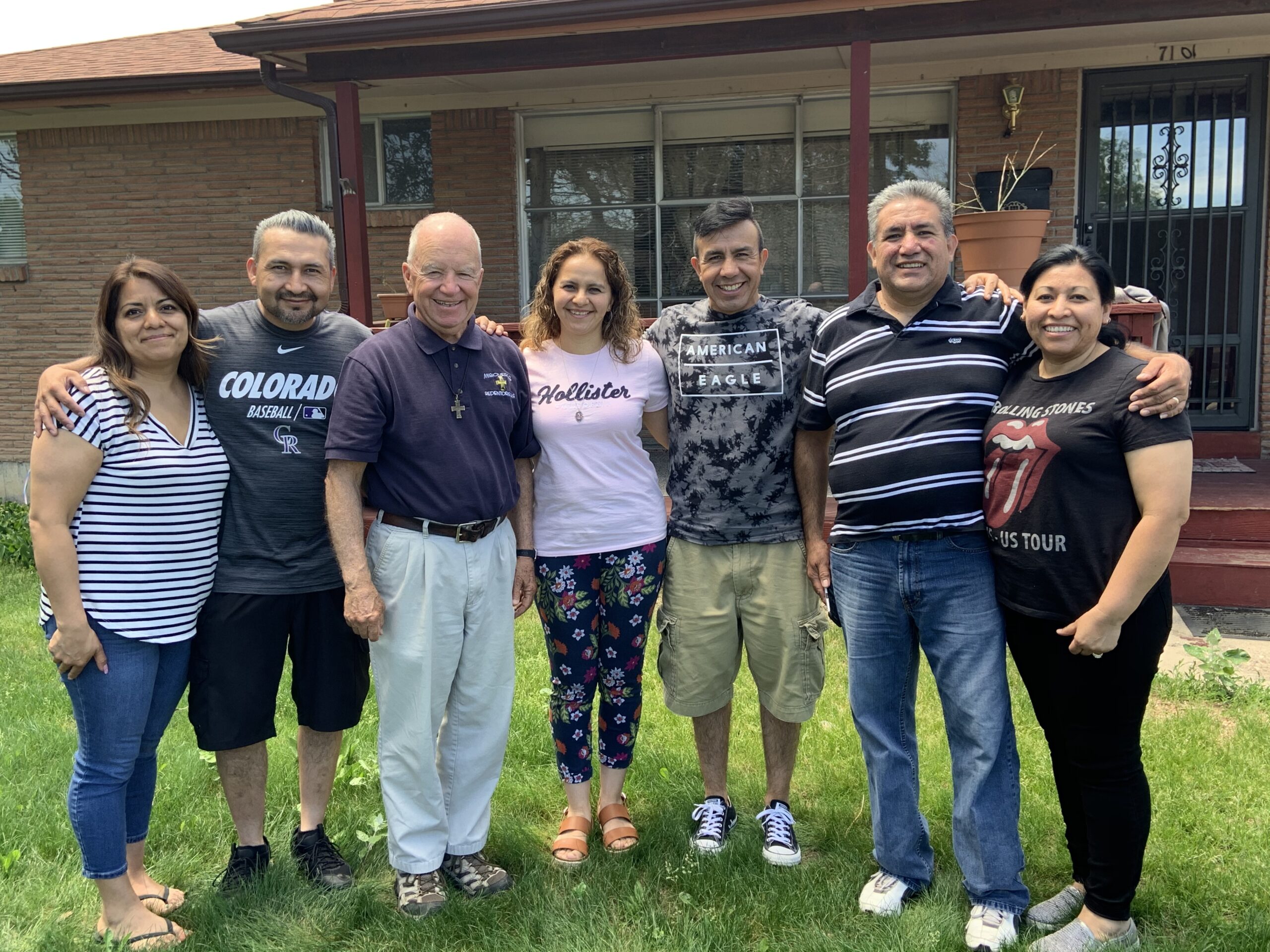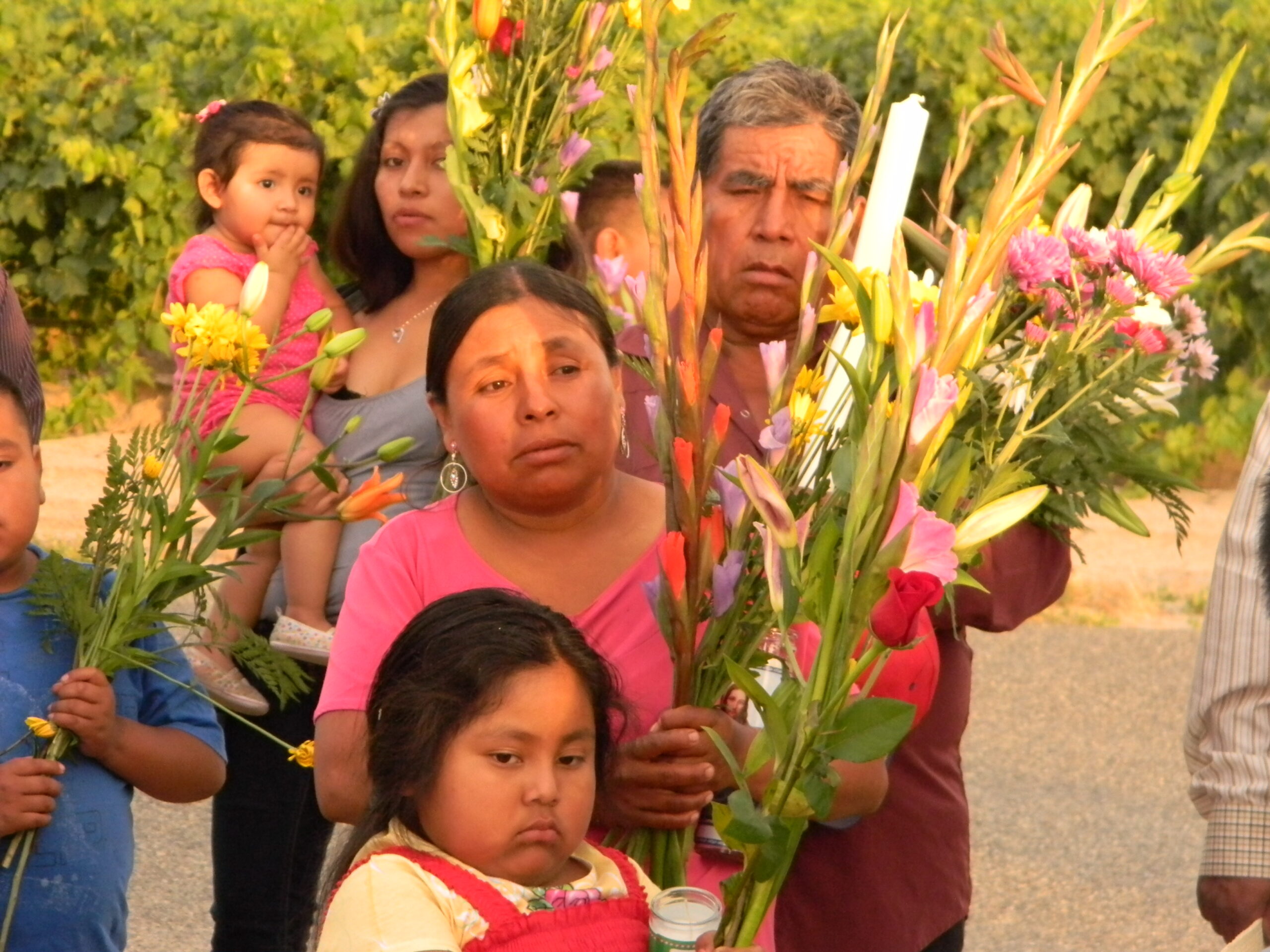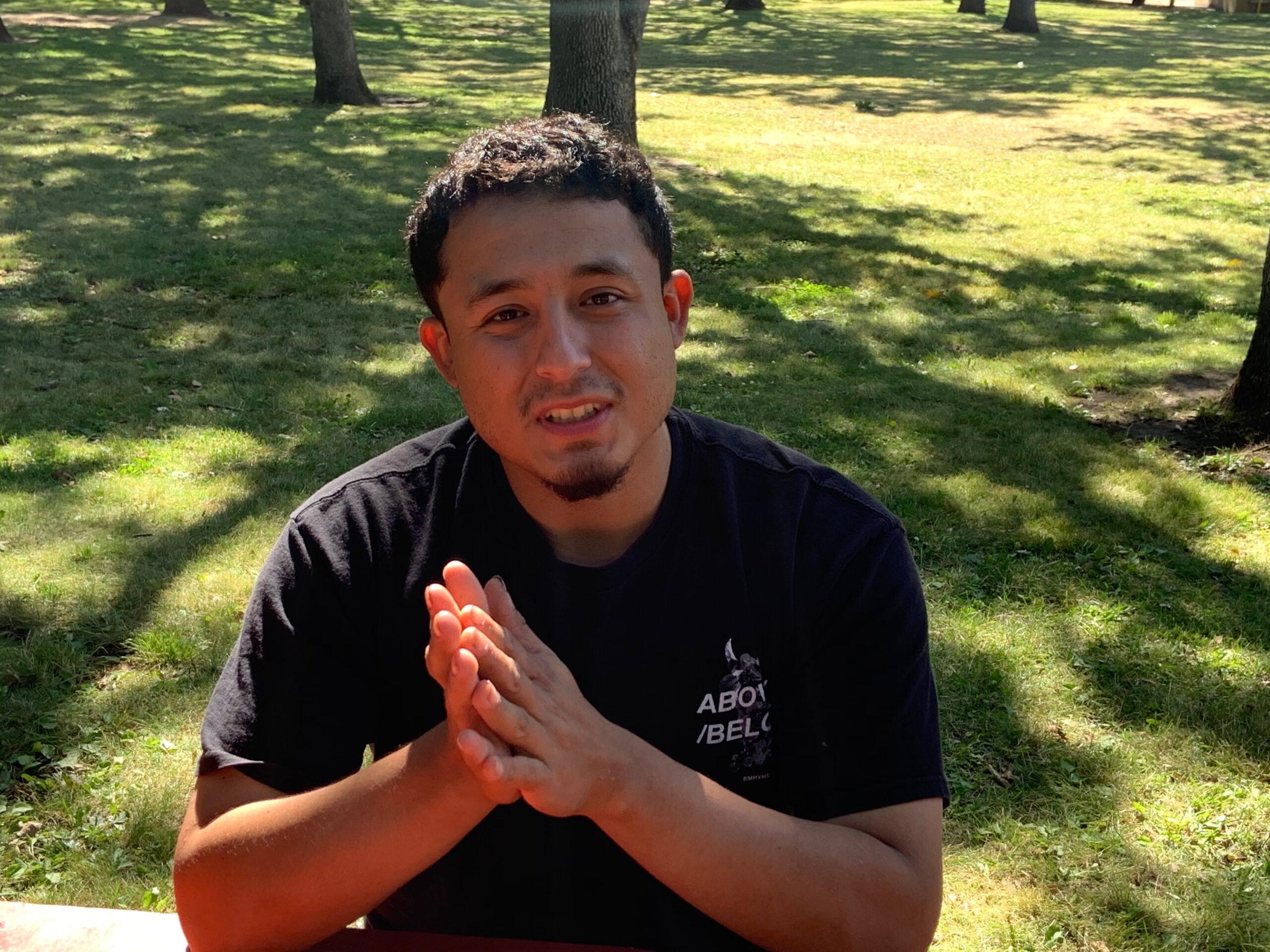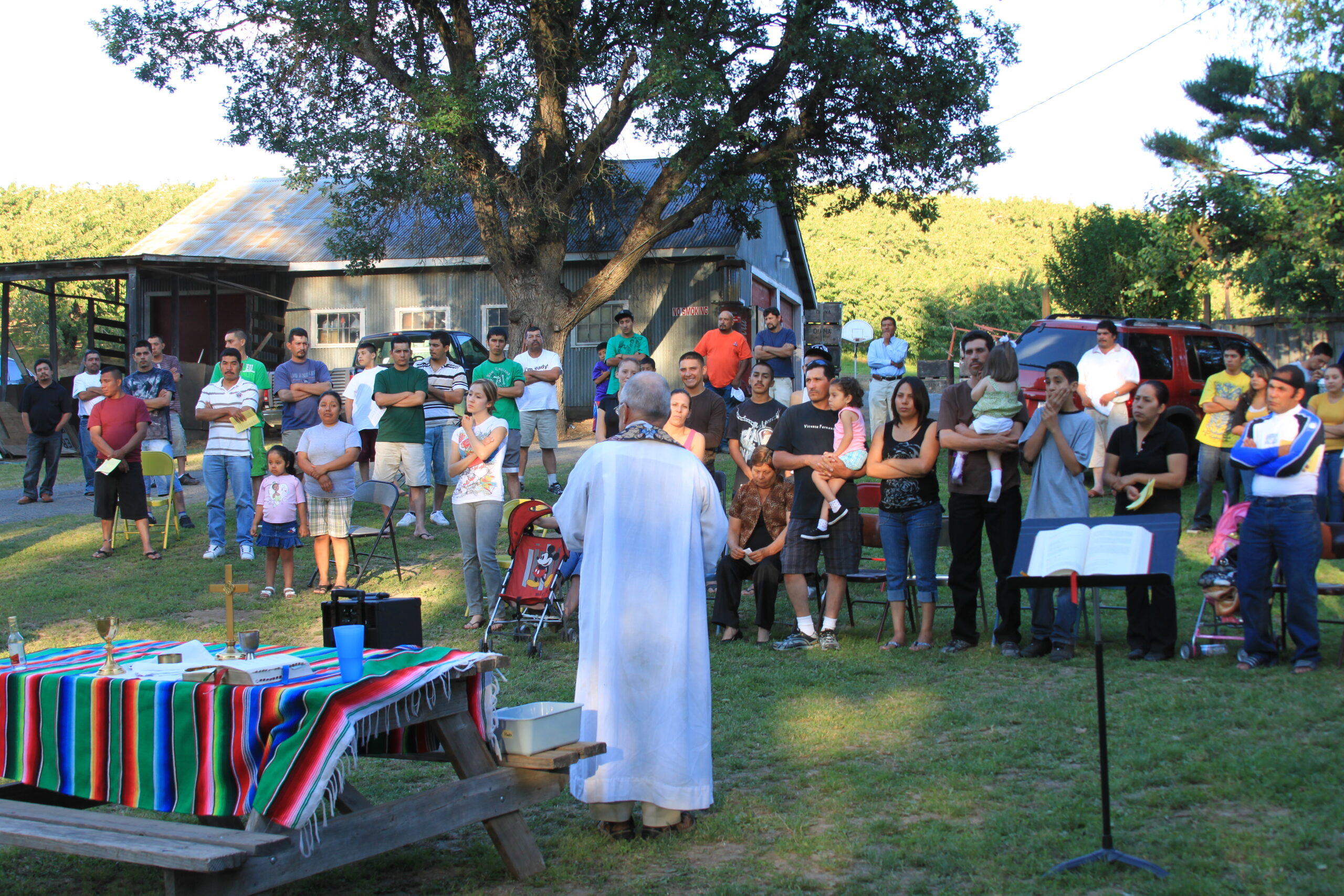Eucharist today: Obstacles to receiving sacraments / Obstáculos Misas a la recepción de los sacramentos
Obstacles migrants experience when asking for sacraments
Migrants find rules in the Church in the U.S. confusing and inconsistent when asking that their children receive the sacraments of initiation. One migrant worker said, “Las reglas de la Iglesia aquí forman barreras que separan a los migrantes de la gracia de los sacramentos.” (Church rules here form barriers that prevent migrants from receiving the grace of the sacraments.)
For twenty-five years I have heard an amazing assortment of difficulties experienced by migrant families in getting their children into programs of religious formation. One parish administrator said, “What do you want? Quality or quantity?” People in that parish found the programs to be of long duration (two years for First Eucharist and two years for Confirmation) and having rigid attendance rules that were simply not possible in the context of migrant farm work. Unfortunately, these rules produce extreme hardships on migrant workers. Many migrant families see these requirements as punitive for their inability to participate regularly in church activities. Rigid rules do not provide “quality” when so many hard-working poor people are excluded from the programs.
The issue is not a choice between quality or quantity, but rather a question of making the grace of sacrament available to the people of God. Rules for good order can never be allowed to form barriers to the participation of Catholics, especially the poor. Placing heavy obligations on the poor is not good catechesis. Rules are necessary for good order in the administration of the sacraments, but all rules should be sufficiently flexible to meet the pastoral needs of people who have little control of the time they have available for worship and church participation. To best use time, space and personnel, parishes establish programs for sacramental preparation. As the parishes establish these programs they place expectations that are extremely difficult for migrants. Migrants have little control of their hours of work. Their jobs are temporary and insecure. Many programs are rigidly administered, and little is done for those unable to fulfill all the requirements.
Invitation or obligation
The migrants’ sense of obligation is overwhelming. Heavy burdens have been placed on people that lead to an intense sense of unworthiness. These burdens are laced with disciplines that deny people access to the grace of Eucharist and Reconciliation. This is not to trivialize proper attitudes necessary for receiving the sacraments, but we need to reflect more on the letter of the Apostles to the Gentiles, “It is the decision of the Holy Spirit, and ours too, not to lay on you any burden beyond that which is strictly necessary” (Acts 15:28).
One couple who had been married civilly for seven years and have two children were misinformed by a priest that they could not be married because they had not been Confirmed. When they asked what they needed to do to receive Confirmation, he said they could not enter the Confirmation classes because they were living in sin and not married in the Church. This would appear humorous if it were not so tragic.
It is important to establish basic requirements for marriage. The requirements need to reflect the life situations of people of faith. They should not become obstacles to migrants looking to receive the gift of sacrament. Consideration is needed for the difficulties of long hours of work, the inconsistency of work schedules, and the mobility of the migrant worker. Often parishes provide very limited opportunities for preparation classes or options for those unable to come at the times that programs are offered.
It is quite common to meet couples living in committed faithful relationships that simply have not been recognized by the Church. For many such unions, it is difficult to find church ministers who help them regularize their marriage in the Church. They often are denied access to take part in activities of the church such as being godparents or sponsors for sacraments because they are not married in the church, yet when they seek sacramental marriage, they experience barriers to regularizing their marriage in the Church.
The minister in the church needs to view each contact with the migrant as an opportunity to invite and welcome the person to the grace of Christ. It is wrong to ask people if they are married in the Church if one is not ready to invite them to regularize their union in the Church. The minister should not ask the question if he is not ready to say, “Since you are not married in the Church, what can we do to regularize your union?” Then one needs to be willing to walk them through the process to get married in the Church.
When they are able to attend Mass, many migrants hear sermons that heap shame and guilt on them. They are told that they are not good Catholics because their attendance is irregular or because of some other lack in their lives. Migrants live a hard life, separated from family and friends. They work long hours, and they live in a foreign environment that calls them unskilled and uneducated. Moreover, from the pulpit they hear that they are unfaithful. Yet, they are Christ, “When I was hungry you gave me to eat…..” (Mt. 25:35ff).
Listening to migrants tell their stories makes one marvel at the attachment of the poor to the Catholic faith. With questionable catechesis, poor pastoral attention, barriers to receiving the sacraments, the Catholicism deeply rooted in the migrant community is amazing.
(Bishop John Steinbock’s message at the Fresno Diocesan Convocation, 2010)
Obstáculos a la recepción de los sacramentos
Los migrantes que desean que un niño o niña reciba el Bautismo, la Confirmación, o la Primera Comunión encuentran reglas en la Iglesia en los Estados Unidos confusas e inconsistentes. Un trabajador migrante dijo: “Las reglas de la Iglesia aquí forman barreras que separan a los migrantes de la gracia de los sacramentos”.
Por diez años yo he escuchado de que las familias migrantes experimentan una asombrosa variedad de dificultades al intentar inscribir a sus hijos en programas de formación religiosa. Un administrador de una parroquia dijo: “¿Qué quieren? ¿Calidad o cantidad?” En esa parroquia los programas eran de dos años para la Primera Comunión y dos años para la Confirmación. Además, tenían reglas rígidas de asistencia que eran imposibles de cumplir en el contexto del trabajo agrícola del migrante. Desafortunadamente, estas reglas causan grandes apuros para los trabajadores migrantes. Muchas familias migrantes sienten que estos requisitos los castigan por su incapacidad de participar regularmente en las actividades de la Iglesia. Las reglas rígidas no proveen calidad cuando se excluye de estos programas a tanta gente pobre y trabajadora.
No es una opción entre calidad o cantidad, sino una cuestión de permitir que la gracia de los sacramentos esté disponible para el Pueblo de Dios. Nunca se debe permitir que las reglas del buen orden formen barreras para la participación de los católicos, especialmente de los pobres. No es buena catequesis abrumar al pobre con obligaciones excesivas. Las reglas se necesitan para el buen orden en la administración de los sacramentos, pero todas las reglas deben de ser lo suficientemente flexibles para satisfacer las necesidades pastorales de la gente que tiene poco control del tiempo disponible para rendir culto y participar en la iglesia. Para usar el tiempo, el espacio y el personal adecuadamente, las parroquias establecen programas para la preparación sacramental. Al establecer estos programas, las parroquias fijan expectativas que son demasiado difíciles para las familias migrantes. Los migrantes tienen poco control de sus horarios de trabajo y sus trabajos son temporales e inseguros. Tal parece que muchos programas están rígidamente administrados y se presta poca atención a aquellos que no pueden cumplir con todos los requisitos.
Invitación u obligación
El sentido de obligación de los migrantes es abrumador. Se les han impuesto inmensas barreras causándoles un inmenso sentido de indignidad. Estas barreras llevan a acciones disciplinarias que le niegan a la gente el acceso a la gracia de la Eucaristía y la Reconciliación. Esto no significa minimizar las actitudes necesarias para recibir los sacramentos, pero debemos reflexionar más sobre la carta de los Apóstoles a los Gentiles: “Fue el parecer del Espíritu Santo y el nuestro no imponerles ninguna otra carga fuera de las indispensables” (Hechos 15,28).
Una pareja que había estado casada por el civil por siete años y tenían dos niños recibió información equivocada por parte de un sacerdote que les dijo que no podían casarse porque no estaban confirmados. Cuando preguntaron qué necesitaban para recibir la Confirmación, el sacerdote les dijo que no podían participar en las clases de Confirmación porque estaban viviendo en pecado y no estaban casados por la Iglesia. Esto puede parecer humorístico, si no fuera tan trágico.
Es importante establecer requisitos básicos para el matrimonio. Los requisitos necesitan estar de acuerdo con la realidad de la gente de fe. No deben ser obstáculos para los migrantes que buscan recibir los sacramentos. Se necesita tomar en cuenta las dificultades de las largas horas de trabajo, la inconsistencia de los horarios y la movilidad del trabajador migrante. A menudo, las parroquias proveen muy pocas oportunidades para las clases de preparación u opciones para aquellos que no pueden participar cuando se ofrecen los programas.
Es muy común encontrarse con parejas que viven juntos en relaciones fieles que no han sido reconocidas por la Iglesia. Para estas parejas, es muy difícil encontrar sacerdotes que les ayuden a casarse por la Iglesia. A menudo se les niega participar en actividades de la iglesia como por ejemplo, no pueden ser padrinos porque no están casados por la Iglesia. Sin embargo, cuando piden casarse por la Iglesia, encuentran barreras para casarse.
El sacerdote en la iglesia debe considerar cada contacto con los migrantes como una oportunidad para invitarlos y acogerlos a la gracia de Cristo. Es incorrecto preguntarle a una pareja si están casados por la Iglesia cuando no se está dispuesto a ayudarles a arreglar su unión en la Iglesia. El sacerdote debe decir: “Como no están casados por la Iglesia, ¿qué podemos hacer para arreglar su unión?” Después uno debe estar dispuesto a guiarlos en el proceso del matrimonio por la Iglesia.
Cuando pueden asistir a misa, muchos de los migrantes escuchan sermones que los hacen sentir culpables y avergonzados. Les dicen que no son buenos católicos porque no van a misa con regularidad o por que les falta algo más en sus vidas. Los migrantes tienen una vida muy difícil, separados de su familia y amigos. Trabajan largas horas y viven en ambiente foráneo que los considera sin habilidades ni educación. Además, muchas veces escuchan desde el púlpito que son infieles. Aún así, son Cristo: “Porque tuve hambre y ustedes me alimentaron; tuve sed y ustedes me dieron de beber. Pasé como forastero y ustedes me recibieron en su casa” (Mt. 25,35).
Al escuchar a los migrantes contar sus historias, uno se maravilla de la unión que los pobres tienen con la fe católica. Con una catequesis cuestionable, poca atención pastoral y barreras para recibir los sacramentos, es increíble el arraigo que tiene la comunidad migrante con el catolicismo.
(El Obispo John Steinbock mensaje en la Convocación Diocesana de Fresno, 2010)
Here are ten themes to be covered considering participation in the Eucharist today:
- Role of the Eucharist in my own personal vocation story
- Benefits of celebration of Eucharist where migrants gather
- Exposure of obstacles to reception of First Eucharis that migrants experience
- Bishop John Steinbock’s reflection at Fresno Convocation of Clergy, 2010
- “You only have the time that God gives you”
- Responsibility of the priest to make the word and the sacramental presence of Christ present for the People of God
- Remember that the sacraments of Baptism, Confirmation and Eucharist are sacraments of initiation
- Involve the parents in the sacramental preparation of children
- The place of Mystagogia, continuing education and spiritual development
- Quality migrant ministry can inspire the ordinary ministry of our communities
Aquí hay diez temas considerando participación en la eucaristía hoy:
- Papel de la Eucaristía en mi propia historia vocacional personal
- Beneficios de la celebración de la Eucaristía donde se reúnen los migrantes
- Exposición de obstáculos a la recepción de la Primera Comunión que experimentan los migrantes
- Reflexión del obispo John Steinbock en Fresno Convocación de los Cleros, 2010
- “Solo tienes el tiempo que Dios te da”
- Responsabilidad del sacerdote de hacer presente la palabra y la presencia sacramental de Cristo para el Pueblo de Dios
- Recuerde que los sacramentos del Bautismo, la Confirmación y la Eucaristía son sacramentos de iniciación.
- Involucrar a los padres en la preparación sacramental de los niños.
- El lugar de mystagogia, educación continua y desarrollo espiritual
- Un ministerio migrante de calidad puede inspirar el ministerio ordinario de nuestras comunidades.
